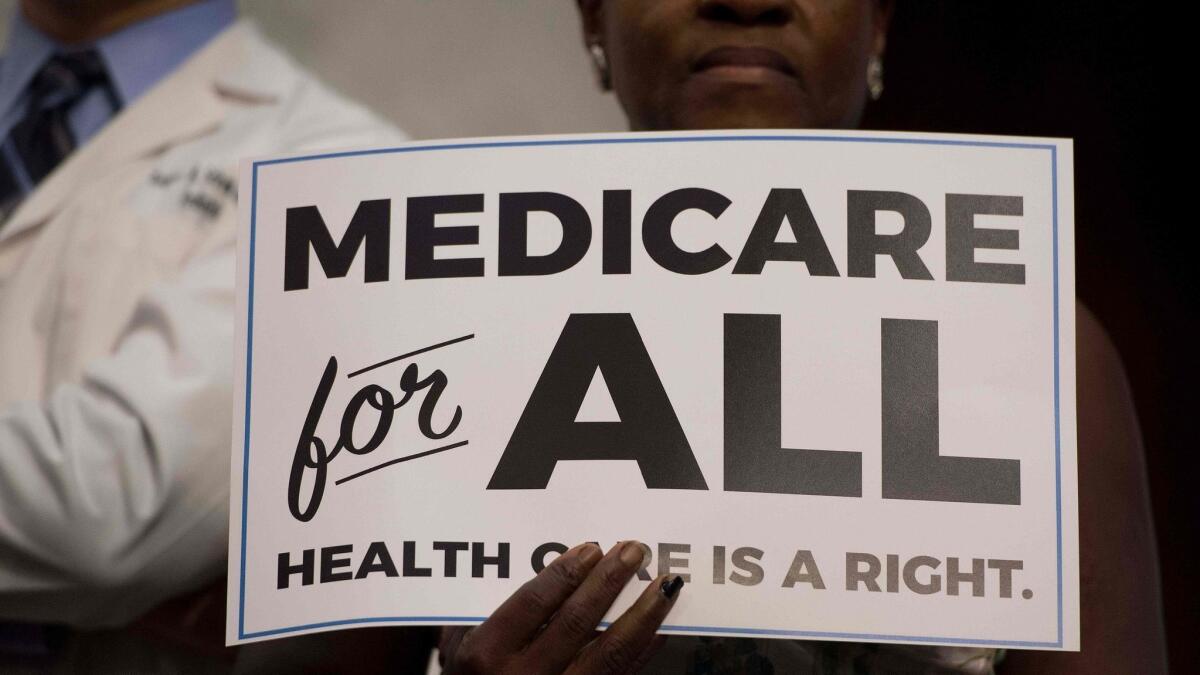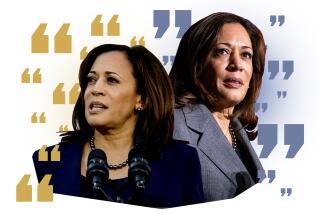Beyond the slogan, ‘Medicare for all’ vexes Democratic presidential candidates

As Democratic candidates leap into the presidential fray, many have latched onto a catchy political rallying cry: “Medicare for all.”
But don’t assume they’re all talking about the same thing.
The pithy slogan has driven the first major policy debate of the budding Democratic primary. When Sen. Kamala Harris of California breezily pledged at a nationally televised town hall to eliminate private insurance in favor of a federal health plan last month, many of her rivals hurriedly distanced themselves from that prospect.
Others in the party’s left flank, largely aligned with probable candidate Sen. Bernie Sanders (I-Vt.), embraced the concept as essential to achieving true healthcare overhaul.
The divergent responses underscored the knotty politics behind the seemingly simple motto. Democratic presidential hopefuls now face the delicate task of explaining how, exactly, each of them interprets Medicare for all.
“When you’re hearing a politician speak, you’ve got to know the politician to know what they mean by Medicare for all,” said Michael Lighty, a fellow at the Sanders Institute, a think tank founded by the senator’s wife.
The public appears increasingly receptive to a broad government healthcare system. A January poll by the Kaiser Family Foundation found that 56% of respondents — and 81% of Democrats — backed a “national health plan, sometimes called Medicare for all.” That’s a 16-point increase in support since the group first tracked public opinion on the proposal in 1998.
An inflection point, said Liz Hamel, director of public opinion and survey research at the foundation, was in February 2016, in the heat of that year’s Democratic primary in which Sanders centered his insurgent campaign on Medicare for all. For the first time, public approval of the policy hit 50%.
2020 Democratic presidential candidates: Who’s in and who’s on the fence? »
In 2017, Sanders introduced a Medicare for all bill that would dramatically expand and revamp Medicare, the federal health insurance for people aged 65 and older. Under the proposal, all United States residents would be enrolled in a national health plan that would offer wide-ranging benefits, including hospital services, doctor visits and prescription drugs. Multiple studies estimated the proposal would increase federal spending by $32 trillion over 10 years.
The bill was politically dead on arrival, with Republicans controlling Congress and the White House.
Still, 16 Democratic senators signed on as co-sponsors, including 2020 contenders Kirsten Gillibrand of New York, Cory Booker of New Jersey and Elizabeth Warren of Massachusetts.
Harris, a first-term senator, announced that she’d be a co-sponsor weeks before it was introduced. She touted her support in a CNN town hall after she launched her presidential run.
Asked if that would mean doing away with private insurance companies, Harris responded bluntly: “Let’s eliminate all that. Let’s move on.”
In theory, this was not a surprise. Sanders’ bill plainly states it would ban commercial or employee-based coverage that duplicates the federal benefits envisioned in his plan.
Nonetheless, her remark led to a minor maelstrom. Howard Schultz, the former Starbucks chief now mulling an independent campaign for president, denounced it as “not American.” Some of Harris’ Democratic rivals rejected the eradication of commercial insurance.
“Even countries that have vast access to public healthcare have private healthcare. So, no,” said Booker, despite co-sponsoring Sanders’ bill.
When Warren, another co-sponsor, was asked during a Bloomberg television interview if she supports doing away with private insurers, she simply didn’t address the question.
The role of insurance companies is an unavoidable flashpoint. While the Kaiser Family Foundation found nearly 60% of the public said they support a Medicare for all plan, that approval plummets to 37% if it would eliminate private insurers.
Many are confused by how such a proposal would affect them. More than half of the respondents believed they could keep their employer-sponsored plan under Medicare for all, which is not the case under Sanders’ bill.
Even the vocabulary surrounding the issue can be baffling.
Universal coverage, for example, is not the same thing as single-payer. The former is a goal for everyone to have some form of health insurance; the latter is a specific type of system where one entity — usually the government — pays for everyone’s medical care.
“Universal coverage is definitely something that gets a positive reaction from people, as does the general concept of the federal government doing more to provide health insurance for people,” Hamel said. “People agree on the goals and don’t agree on the ways to get there.”
Single-payer advocates have seized on Medicare as an easily recognizable symbol of government healthcare, albeit one with significant reliance on private insurers.
“The branding of ‘Medicare for all’ is so important because the vast majority of Americans know Medicare, they like it, they have family members that are on it,” said Topher Spiro, a health policy expert at the Center for American Progress, a liberal think tank.
Other Democrats have sought to take up the healthcare reform banner without going all in on Sanders’ plan. The Center for American Progress suggests a national insurance program that would allow those who get coverage through an employer, Veterans Affairs or other federal benefits to keep their existing plans.
Other ideas include creating a public insurance option to compete with private insurers or letting people buy into Medicare or Medicaid, the subsidized healthcare program for the poor.
“I believe we should protect and strengthen the Affordable Care Act, not repeal it,” said Sen. Sherrod Brown (D-Ohio), who is weighing his own White House bid. “And one of the best ways to do that is to open up Medicare to people starting in their 50s and give them the option to buy in if they want to.”
Popular support for these more incremental options far exceed approval of a sweeping Medicare for all, according to the foundation poll.
But while proponents say such an approach is more pragmatic, it risks coming off as settling for half-measures to those in the Democratic base eager for more ambitious reform.
So far, some Democratic candidates have tried to take multiple tacks, signing onto healthcare bills that have a narrower scope while also backing a broader Medicare for all concept. The all-of-the-above approach can require some delicate maneuvering.
Harris, for example, was accused of backing away from her vow to eliminate private insurance when in the days following her town hall, her campaign noted her long-held support for other healthcare bills.
“Medicare for all is the plan that she believes will solve the problem and get all Americans covered. Period,” said Ian Sams, a Harris campaign spokesman. “She has co-sponsored other pieces of legislation that she sees as a path to getting us there, but this is the plan she is running on.”
But for all its messiness, liberal activists are hoping the Medicare for all parsing in the primary could end up paving the way for some version of the policy to come to fruition. There’s historical precedent that it might.
The 2008 Democratic primary was marked by the top three contenders — Hillary Clinton, John Edwards and Barack Obama — wrangling over healthcare reform.
“Without that debate, we wouldn’t have reached the full set of policies that became the Affordable Care Act,” said Ben Wikler, Washington director of the grass-roots group MoveOn.org. “That’s the kind of debate we’re hoping for.”
Times staff writer Janet Hook contributed to this report.
More to Read
Get the L.A. Times Politics newsletter
Deeply reported insights into legislation, politics and policy from Sacramento, Washington and beyond. In your inbox three times per week.
You may occasionally receive promotional content from the Los Angeles Times.











